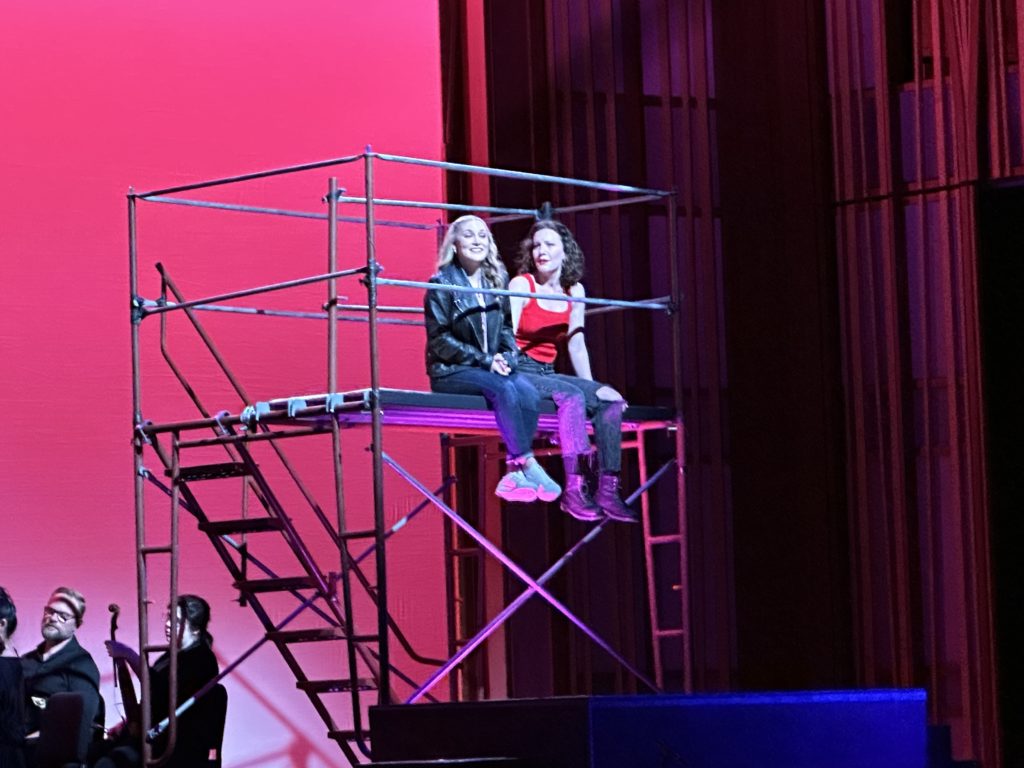Rewarding Staging of Handel’s Early Gem ‘Il Trionfo del Tempo e del Disinganno’
After experiencing Opera Neo’s Friday production of Handel’s Il Trionfo del Tempo e del Disinganno at The Conrad, I cannot resist asking the question, “Will the real George Frederick Handel please stand?”
Most of us grew up knowing George Frideric Handel as the master of sacred oratorios such as Messiah and Judas Maccabaeus, works brimming with heaven-storming choruses and devotional arias confected directly from Sacred Scripture.But what if we had been exposed only to the composer’s first love compositions—his operas and parallel secular works–such as Giulio Cesare and secular oratorios such as Il Trionfo del tempo e del Disinganno, filled with arias and ensembles pulsing with decidedly terrestrial passions and bloody historical events?
Unlike his pious contemporary fellow countrymen Georg Philipp Telemann and J. S. Bach, the young Handel escaped the isolation of German Protestant musical culture and went to Italy to immerse himself in Italian opera. In 1707 at 22 years of age, Handel composed Il Trionfo del Tempo e del Disinganno in Rome, using a secular libretto written by one of his cultured Roman patrons, Cardinal Benedetto Pamphili. We know that Handel was proud of this early work, because much later in his career while composing and producing his Italian operas in London, he made an English translation of this early oratorio, calling it The Triumph of Time and Truth, which he successfully produced on several later occasions.
The plot of Il Tempo . . . is a philosophical contest between conflicting ideals: the alluring virtues of beauty and pleasure pitted against the inevitabilities of time and disillusion, a concept that Enlightenment intellectuals no doubt found compelling, although one that later composers such as Verdi and Puccini would never have touched with a proverbial ten-foot pole!
Opera Neo’s production of Il Trionfo del Tiempo e del Disinganno brought back soprano Ashley Fabian to sing Bellezza (Beauty) and mezzo-soprano Stephanie Doche as Piacere (Pleasure), two singers who sang major roles magnificently in the company’s 2022 production of Handel’s Ariodante and whose chemistry in this Handel work again proved to be nothing short of breathtaking.
Fabian’s supple coloratura soprano, radiant throughout her range, aptly invigorated Handel’s arias filed with lavish ornamentation in his effervescent characterization of Bellezza, yet her nuanced dramatic interpretation took into account Beauty’s fragile insecurities. As the imperious Piacere, Doche gave a striking, flamboyant edge to Pleasure, subduing with apparent ease the composer’s most daunting fioriture as her resonant mezzo-soprano amply filled the hall.
As Tempo, tenor Brian Skoog was required to admonish Belleza at length of the pitiable transience of her state, which he accomplished with admirable, zealous authority, although the role’s rather low tessitura prevented the audience from experiencing at length the glory of his gleaming upper register. Lauren Randolph’s persuasive mezzo-soprano brought appropriate gravitas to Disinganno as she floated her graceful, extended melodic lines that communicated an apt balance of warning and comfort.
Adroitly moving from the harpsichord to the chamber organ, conductor Jory Vinikour’s spirited direction smartly developed the score’s effulgent drama as he coaxed vibrant commitment from Opera Neo’s onstage chamber ensemble. Kudos to Concertmaster Tera Shimizu for virtuoso obbligatos, especially in the orchestral overture, almost a single movement violin concerto, and to Principal Cello Alexa Haynes-Pilon for exceptionally accomplished descants as well as her polished continuo work. Principal Theorbo John Lenti and the second harpsichord player Phillippe LeRoy also contributed significantly to the vigor of the continuo group, the indispensable foundation of stylish Baroque performance.
Sydney Roslin successfully staged this philosophical contretemps as a fiery encounter of four headstrong individuals constantly bordering on physical altercation, although they occasionally ascended a towering structure of open scaffolding, designed by Peter Kozma, that allowed for welcome moments of reflective respite above the fray. Roslin’s costume design provided Bellezza and Piacere with chic contemporary attire, and it was hard to miss the symbolism of Pleasure pressing Beauty to flaunt her wares in the latter’s racy leather jacket. Tempo’s courtroom conservative coat and tie and Disinganno’s sober midnight blue sheath provided the expected sobering contrast.
Pablo D. Antón’s sensitive lighting design bathed the vast wall behind the stage in an array of varying subtle hues that brought out or complemented the tenor of the singers’ arguments.
Opera Neo staged this Handel opera at La Jolla’s Conrad Prebys Center for the Performing Arts on July 8 & 9, 2023. The opening night performance was attended for this review. The Opera Neo Summer Festival continues with Mozart’s ‘Mitridate’ on July 14 & 15 staged at Park & Market in San Diego’s East Village..

Ken Herman, a classically trained pianist and organist, has covered music for the San Diego Union, the Los Angeles Times’ San Diego Edition, and for sandiego.com. He has won numerous awards, including first place for Live Performance and Opera Reviews in the 2017, the 2018, and the 2019 Excellence in Journalism Awards competition held by the San Diego Press Club. A Chicago native, he came to San Diego to pursue a graduate degree and stayed.Read more…

